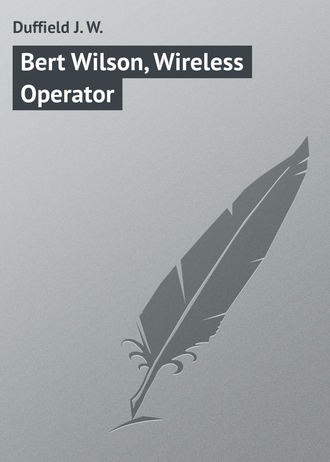 полная версия
полная версияBert Wilson, Wireless Operator

J. W. Duffield
Bert Wilson, Wireless Operator
CHAPTER I
Running Amuck
“Amuck! Amuck! He’s running amuck! Quick! For your lives!”
The drowsy water front pulsed into sudden life. There was a sound of running feet, of hoarse yells, a shriek of pain and terror as a knife bit into flesh, and a lithe, brown figure leaped upon the steamer’s rail.
It was a frightful picture he presented, as he stood there, holding to a stanchion with one hand, while, in the other, he held a crooked dagger whose point was stained an ominous red. He was small and wiry, only a little over five feet in height, but strong and quick as a panther. His black hair, glossy with cocoa oil, streamed in the wind, his eyes were lurid with the wild light of insanity, his lips were parted in a savage snarl, and he was foaming at the mouth. He had lost all semblance of humanity, and as he stood there looking for another victim, he might have been transported bodily from one of Doré’s pictures of Dante’s Inferno. Suddenly, he caught sight of a group of three coming down the pier, and leaping to the wharf, he started toward them, his bare feet padding along noiselessly, while he tightened his grip on the murderous knife. A shot rang out behind him but missed him, and he kept on steadily, drawing nearer and nearer to his intended prey.
The three companions, toward whom doom was coming so swiftly and fearfully, were now halfway down the pier. They were typical young Americans, tall, clean cut, well knit, and with that easy swing and carriage that marks the athlete and bespeaks splendid physical condition. They had been laughing and jesting and were evidently on excellent terms with life. Their eyes were bright, their faces tinged with the bronzed red of perfect health, the blood ran warmly through their veins, and it seemed a bitter jest of fate that over them, of all men, should be flung the sinister shadow of death. Yet never in all their life had they been so near to it as on that sleepy summer afternoon on that San Francisco wharf.
At the sound of the shot they looked up curiously. And then they saw.
By this time the Malay was not more than fifty feet away. He was running as a mad dog runs, his head shaking from side to side, his kriss brandished aloft, his burning eyes fixed on the central figure of the three. He expected to die, was eager to die, but first he wanted to kill. The dreadful madness peculiar to the Malay race had come upon him, and the savage instincts that slumbered in him were now at flood. He had made all his preparations for death, had prayed to his deities, blackened his teeth as a sign of his intention, and devoted himself to the infernal gods. Then by the use of maddening drugs he had worked himself into a state of wild delirium and started forth to slay. They had sought to stop him as he rushed out from the cook’s galley, but he had slashed wildly right and left and one of them had been left dangerously wounded on the steamer’s deck. The captain and mates had rushed to their cabins to get their revolvers, and it was the shot from one of these that had tried vainly to halt him in his death dealing course. The crew, unarmed, had sought refuge where they could, and now, with his thirst for blood still unslaked, he rushed toward the unsuspecting strangers.
For one awful instant their hearts stood still as they caught sight of the fiendish figure bearing down upon them. None of them had a weapon. They had never dreamed of needing one. Their stout hearts and, at need, their fists, had always proved sufficient, and they shared the healthy American repugnance at relying on anything else than nature had given them. There was no way to evade the issue. Had they turned, the madman, with the impetus he already had, would have been upon them before they could get under way. There was no alternative. They must play with that grim gambler, Death, with their lives as the stakes. And at the thought, they stiffened.
The Malay was within ten feet. Quick as a flash, the taller of the three dove straight for the madman’s legs. The latter made a wicked slash downward, but his arm was caught in a grip of iron, and the next instant the would-be murderer was thrown headlong to the pier, his knife clattering harmlessly to one side. The three were on him at once, and, though he fought like a wildcat, they held him until the crowd, bold now that the danger was past, swarmed down on the wharf and trussed him securely with ropes. Then the trio rose, shook themselves and looked at each other.
“By Jove, Bert,” said the one who had grasped the Malay’s arm as it was upraised to strike, “that was the dandiest tackle I ever saw, and I’ve seen you make a good many. If you’d done that in a football game on Thanksgiving day, they’d talk of it from one end of the country to the other.”
“O, I don’t know, Dick,” responded Bert. “Perhaps it wasn’t so bad, but then, you know, I never had so much at stake before. Even at that I guess it would have been all up with me, if you hadn’t grabbed that fellow’s hand just at the minute you did.”
“If I hadn’t, Tom would,” rejoined Dick lightly. “He went for it at the same instant, but I was on the side of the knife hand and so got there first. But it was a fearfully close shave,” he went on soberly, “and I for one have had enough of crazy Malays to last me a lifetime.”
“Amen to that,” chimed in Tom, fervently, “a little of that sort of thing goes a great way. If this is a sample of what we’re going to meet, there won’t be much monotony on this trip.”
“Well, no,” laughed Bert, “not so that you could notice it. Still, when you tackle the Pacific Ocean, you’re going to find it a different proposition from sailing on a mill pond, and I shouldn’t be surprised if we found action enough to keep our joints from getting rusty before we get back.”
The crowd that had seemed to come from everywhere were loud in their commendation of the boys’ courage and presence of mind. Soon, an ambulance that had been hastily summoned rattled up to the pier, at top speed, and took charge of the wounded sailor, while a patrol wagon carried the maniac to the city prison. The throng melted away as rapidly as it had gathered, and the three chums mounted the gangway of the steamer. A tall, broad shouldered man in a captain’s uniform advanced to greet them.
“That was one of the pluckiest things I ever saw,” he said warmly, as he grasped their hands. “You were lucky to come out of that scrape alive. Those Malays are holy terrors when they once get started. I’ve seen them running amuck in Singapore and Penang before now, but never yet on this side of the big pond. That fellow has been sullen and moody for days, but I’ve been so busy getting ready to sail that I didn’t give it a second thought. I had a bead drawn on the beggar when he was making toward you, but didn’t dare to fire for fear of hitting one of you. But all’s well that ends well, and I’m glad you came through it without a scratch. You were coming toward the ship,” he went on, as he looked at them inquiringly, “and I take it that your business was with me.”
“Yes, sir,” answered Bert, acting as spokesman. “My name is Wilson, and these are my two friends, Mr. Trent and Mr. Henderson.”
“Wilson,” repeated the captain in pleased surprise. “Why, not the wireless operator that the company told me they had engaged to make this trip?”
“The same,” replied Bert, smiling.
“Well, well,” said the captain, “I’m doubly glad to meet you, although I had no idea that our first meeting would take place under such exciting circumstances. You can’t complain that we didn’t give you a warm reception,” he laughed. “Come along, and I’ll show you your quarters and introduce you to the other officers.”
Had any one told Bert Wilson, a month earlier, that on this June day he would be the wireless operator of the good ship “Fearless,” Abel Manning, Captain, engaged in the China trade, he would have regarded it as a joke or a dream. He had just finished his Freshman year in College. It had been a momentous year for him in more ways than one. He had won distinction in his studies – a matter of some satisfaction to his teachers. But he had been still more prominent on the college diamond – a matter of more satisfaction to his fellow students. He had just emerged from a heart breaking contest, in which his masterly twirling had won the pennant for his Alma Mater, and incidentally placed him in the very front rank of college pitchers. His plans for the summer vacation were slowly taking shape, when, one day, he was summoned to the office of the Dean.
“Sit down, Wilson,” he said, as he looked up from some papers, “I’ll be at liberty in a moment.”
For a few minutes he wrote busily, and then whirled about in his office chair and faced Bert, pleasantly.
“What are your plans for the summer, Wilson?” he asked. “Have you anything definite as yet?”
“Not exactly, sir,” answered Bert. “I’ve had several invitations to spend part of the time with friends, but, as perhaps you know, I haven’t any too much money, and I want to earn some during the vacation, to help me cover my expenses for next year. I’ve written to my Congressman at Washington to try to get me work in one of the wireless stations on the coast, but there seems to be so much delay and red tape about it that I don’t know whether it will amount to anything. If that doesn’t develop, I’ll try something else.”
“Hum,” said the Dean, as he turned to his desk and took a letter from a pigeon hole. “Now I have here a line from Mr. Quinby, the manager of a big fleet of steamers plying between San Francisco and the chief ports of China. It seems that one of his vessels, the Fearless, needs a good wireless operator. The last one was careless and incompetent, and the line had to let him go. Mr. Quinby is an old grad of the college, and an intimate personal friend of mine. He knows the thoroughness of our scientific course” – here a note of pride crept into the Dean’s voice – “and he writes to know if I can recommend one of our boys for the place. The voyage will take between two and three months, so that you can be back by the time that college opens in the Fall. The pay is good and you will have a chance to see something of the world. How would you like the position?”
How would he like it? Bert’s head was in a whirl. He had always wanted to travel, but it had seemed like an “iridescent dream,” to be realized, if at all, in the far distant future. Now it was suddenly made a splendid possibility. China and the islands of the sea, the lands of fruits and flowers, of lotus and palm, of minarets and pagodas, of glorious dawns and glittering noons and spangled nights! The East rose before him, with its inscrutable wisdom, its passionless repose, its heavy-lidded calm. It lured him with its potency and mystery, its witchery and beauty. Would he go!
He roused himself with an effort and saw the Dean regarding him with a quizzical smile.
“Like it,” he said enthusiastically, “there’s nothing in all the world I should like so well. That is,” he added, “if you are sure I can do the work. You know of course that I’ve had no practical experience.”
“Yes,” said the Dean, “but I’ve already had a talk with your Professor of Applied Electricity, and he says that there isn’t a thing about wireless telegraphy that you don’t understand. He tells me that you are equally familiar with the Morse and the Continental codes, and that you are quicker to detect and remedy a defect than any boy in your class. From theory to practice will not be far, and he is confident that before your ship clears the Golden Gate you’ll know every secret of its wireless equipment from A to Z. I don’t mind telling you that your name was the first one that occurred to both him and myself, as soon as the matter was broached. Mr. Quinby has left the whole thing to me, so that, if you wish to go, we’ll consider the matter settled, and I’ll send him a wire at once.”
“I’ll go,” said Bert, “and glad of the chance. I can’t thank you enough for your kindness and confidence, but I’ll do my very best to deserve it.”
“I’m sure of that,” was the genial response, and, after a few more details of time and place had been settled, Bert took the extended hand of the Dean and left the office, feeling as though he were walking on air.
His first impulse was to hunt up his two chums, Tom and Dick, and tell them of his good fortune. Tom was a fellow classmate, while Dick had had one year more of college life. The bond that united them was no common one, and had been cemented by a number of experiences shared together for several years back. More than once they had faced serious injury or possible death together, in their many scrapes and adventures, and the way they had backed each other up had convinced each that he had in the others comrades staunch and true. During the present year, they had all been members of the baseball team, Tom holding down third base in dashing style and Dick starring at first; and many a time the three had pulled games out of the fire and wrested victory from defeat. In work and fun they were inseparable; and straight to them now Bert went, flushed and elated with the good luck that had befallen him.
“Bully for you, old man,” shouted Dick, while Tom grabbed his hand and clapped him on the back; “It’s the finest thing that ever happened.”
“It sure is,” echoed Tom. “Just think of good old Bert among the Chinks. And the tea houses —and the tomtoms —and the bazaars —and the jinrikishas – and all the rest. By the time he gets back, he’ll have almond eyes and a pig-tail and be eating his rice with chop sticks.”
“Not quite as bad as that, I hope,” laughed Bert. “I’ve no ambition to be anything else than a good American, and probably all I’ll see abroad will only make me the more glad to see the Stars and Stripes again when I get back to ‘God’s country.’ But it surely will be some experience.”
Now that the first excitement was over, the conversation lagged a little, and a slight sense of constraint fell upon them. All were thinking of the same thing. Tom was the first to voice the common thought.
“Gee, Bert,” he said, “how I wish that Dick and I were coming along!”
“Why not?” asked Dick, calmly.
Bert and Tom looked at him in amazement.
“What!” yelled Bert. “You don’t really think there’s a chance?”
“A chance? Yes,” answered Dick. “Of course it’s nothing but a chance – as yet. The whole thing is so sudden and there are so many things to be taken into account that it can’t be doped out all at once. It may prove only a pipe dream after all. But Father promised me a trip abroad at the end of my course, if I got through all right, and, under the circumstances, he may be willing to anticipate a little. Then too, you know, he’s a red-hot baseball fan, and he’s tickled to death at the way we trimmed the other teams this year. And we all know that Tom’s folks have money to burn, and it ought to be no trick at all for him to get their consent. I tell you what, fellows, let’s get busy with the home people, right on the jump.”
And get busy they did, with the result that after a great deal of humming and hawing and backing and filling, the longed for consents were more or less reluctantly given. The boys’ delight knew no bounds, and it was a hilarious group that made things hum on the Overland Limited, as it climbed the Rockies and dropped down the western slope to the ocean. The world smiled upon them. Life ran riot within them. They had no inkling of how closely death would graze them before they even set foot upon their ship. Nor did they dream of the perils that awaited them, in days not far distant when that ship, passing through the Golden Gate, should turn its prow toward the East and breast the billows of the Pacific.
CHAPTER II
An Unexpected Meeting
The “Fearless” was a smart, staunch ship of about three thousand tons – one of a numerous fleet owned by the line of which Mr. Quinby was the manager. She had been built with special reference to the China trade, and was designed chiefly for cargoes, although she had accommodations for a considerable number of passengers. She was equipped with the latest type of modern screw engines, and although she did not run on a fixed schedule, could be counted on, almost as certainly as a regular liner, to make her port at the time appointed. Everything about the steamer was seamanlike and shipshape, and the boys were most favorably impressed, as, under the guidance of Captain Manning, they made their way forward. Here they were introduced to the first and second officers, and then shown to the quarters they were to occupy during the voyage.
Like everything else about the ship, these were trim and comfortable, and the boys were delighted to find that they had been assigned adjoining rooms. By the time they had washed and changed their clothes, it was time for supper, and to this they did ample justice. They were valiant trenchermen, and even the narrow escape of the afternoon had not robbed them of their appetites.
“You’d better eat while you can, fellows,” laughed Bert. “We sail to-morrow, and twenty-four hours from now, you may be thinking so little of food that you’ll be giving it all to the fishes.”
“Don’t you worry,” retorted Dick, “I’ve trolled for bluefish off the Long Island coast in half a gale, and never been seasick yet.”
“Yes,” said Bert, “but scudding along in a catboat is a different thing from rising and falling on the long ocean swells. We haven’t any swinging cabins here to keep things always level, and the ship isn’t long enough to cut through three waves at once like the big Atlantic liners.”
“Well,” said Tom, “if we do have to pay tribute to Neptune, I hope we won’t be so badly off as the poor fellow who, the first hour, was afraid he was going to die, and, the second hour, was afraid he couldn’t die.”
“Don’t fret about dying, boys,” put in the ship’s doctor, a jolly little man, with a paunch that denoted a love of good living; “You fellows are so lucky that they couldn’t kill you with an axe. Though that knife did come pretty near doing the trick, didn’t it? ‘The sweet little cherub that sits up aloft, looking after the life of poor Jack,’ was certainly working overtime, when that Malay went for you to-day.”
“Yes,” returned Dick, “but he slipped a cog in not looking after the poor fellow that brute wounded first. By the way, doctor, how is he? Will he live?”
“O, he’ll pull through all right,” answered the doctor. “I gave his wound the first rough dressing before the ambulance took him away. Luckily, the blade missed any of the vital organs, and a couple of months in the hospital will bring him around all right. That is, unless the knife was poisoned. These beggars sometimes do this, in order to make assurance doubly sure. I picked up the knife as it lay on the pier, and will turn it over to the authorities to-morrow. They’ll have to use it in evidence, when the case comes up for trial.”
He reached into his breast pocket as he spoke and brought out the murderous weapon. The boys shuddered as they looked at it and realized how near they had come to being its victims. They handled it gingerly as they passed it around, being very careful to avoid even a scratch, in view of what the doctor had said about the possibility of it being poisoned.
It was nearly a foot in length, with a massive handle that gave it a secure grip as well as additional force behind the stroke. The hilt was engraved with curious characters, probably an invocation to one of the malignant gods to whom it was consecrated. The blade was broad, with the edge of a razor and the point of a needle. But what gave it a peculiarly deadly and sinister significance was the wavy, crooked lines followed by the steel, and which indicated the hideous wounds it was capable of inflicting.
“Nice little toy, isn’t it?” asked the doctor.
“It certainly is,” replied Bert. “A bowie knife is innocent, compared with this.”
“What on earth is it,” asked Dick, “that makes these fellows so crazy to kill those that have never done them an injury and that they have never even seen? I can understand how the desire for revenge may prompt a man to go to such lengths to get even with an enemy, but why they attack every one without distinction is beyond me.”
“Well,” replied the doctor, “it’s something with which reason has nothing to do. The Malays are a bloodthirsty, merciless race. They brood and sulk, until, like that old Roman emperor – Caligula, wasn’t it? – they wish that the human race had only one neck, so that they could sever it with a single blow. They are sick of life and determine to end it all, but before they go, all the pent up poison of hate that has been fermenting in them finds expression in the desire to take as many as possible with them. Then too, there may be some obscure religious idea underneath it all, of offering to the gods as many victims as possible, and thus winning favor for themselves. Or, like the savage despots of Africa, who decree that when they are buried hundreds of their subjects shall be slaughtered and buried in the same grave, they may feel that their victims will have to serve them in the future world. Scientists have never analyzed the matter satisfactorily.”
“Well,” said Dick, as they rose from the table, “one doesn’t have to be a scientist to know this much at least – that wherever a crazy Malay happens to be, it’s a mighty healthy thing to be somewhere else.”
“I guess nobody aboard this steamer would be inclined to dispute that,” laughed the doctor, as they separated and went on deck.
Although his duties did not begin until the following day, Bert was eager beyond anything else to inspect the wireless equipment of the ship, and went at once to the wireless room, followed by the others.
It was with immense satisfaction that he established that here he had under his hand the very latest in wireless telegraphy. From the spark key to the antennae, waving from the highest mast of the ship, everything was of the most approved and up to date type. No matter how skilful the workman, he is crippled by lack of proper tools; and Bert’s heart exulted as he realized that, in this respect, at least he had no reason for complaint.
“It’s a dandy plant, fellows,” he gloated. “There aren’t many Atlantic liners have anything on this.”
“How far can she talk, Bert?” asked Dick, examining the apparatus with the keenest interest.
“That depends on the weather, very largely,” answered Bert. “Under almost any conditions she’s good for five hundred miles, and when things are just right, two or three times as far.”
“What’s the limit, anyway, Bert?” asked Tom. “How far have they been able to send under the very best conditions?”
“I don’t believe there is any real limit,” answered Bert. “I haven’t any doubt that, before many years, they’ll be able to talk half way round the world. Puck, you know, in the ‘Midsummer Night’s Dream’ boasted that he would ‘put a girdle round the earth in forty minutes.’ Well, the wireless will go him one better, and go round in less than forty seconds. Why, only the other day at Washington, when the weather conditions were just right, the officials there heard two stations talking to each other, off the coast of Chili, six or seven thousand miles away. Of course, ships will never talk at that distance, because they can’t get a high enough mast or tower to overcome the curvature of the earth. But from land stations it is only a question of getting a high enough tower. They can talk easily now from Berlin to Sayville, Long Island, four thousand miles, by means of towers seven or eight hundred feet high. The Eiffel Tower at Paris, because still higher, has a longer range. It isn’t so very long ago that they were glad enough to talk across a little creek or canal, a few feet wide. Then they tried an island, three or four miles away, then another, fourteen miles from the mainland. By the time they had done that, they knew that they had the right principle, and that it was only a matter of time before they’d bind the ends of the earth together. It started as a creeping infant; now, it’s a giant, going round the world in its seven league boots.”
“Hear hear,” cried Dick, “how eloquent Bert is getting. He’ll be dropping into poetry next.”
“Well,” chipped in Tom, “there is poetry sure enough in the crash of the spark and its leap out into the dark over the tumbling waves from one continent to another, but, to me, it’s more like witchcraft. It’s lucky Marconi didn’t live two or three hundred years ago. He’d surely have been burned at the stake, for dabbling in black magic.”








